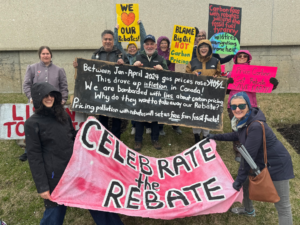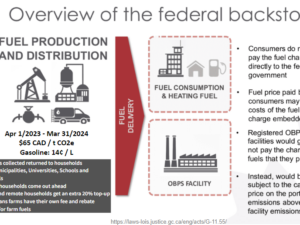with Dr. David Robinson, Tuesday, January 23, 2018 It’s that simple Economic jargon: compensating variation You can think of compensating variation more simply: This is standard economics. Astonishingly*, Carbon Fee and Dividend has rarely been explained by compensating variation. Carbon Fee and Dividend is clearly compensating variation. *Google “carbon fee and dividend” “compensating variation” and you will see that this is “astonishingly” true. Price Effects and Income Effects With Carbon Fee and Dividend , which is compensating variation, there is a changed behaviour because there is a price effect without an income effect which is politically acceptable. How dividends reduce emissions What about the rebound effect? How carbon dividends could help governments finance home retrofits Excellent Dialogue About Dr. David Robinson Reference Materials: Food for thought: Please note:CCL CANADA EDUCATION: The economic theory of carbon fee and dividend
The facts are that we need the carbon price to get up to $150 / tonne. It will be politically acceptable with a dividend. It is that simple.
Compensating variation is a measure of utility change introduced by John Hicks (1939). ’Compensating variation’ refers to the amount of additional money an agent would need to reach her initial utility after a change in prices, a change in product quality, or the introduction of new products.
With taxes to change behaviour, there is a price effect and there is an income effect which is politically unacceptable. Revenue-neutrality vs compensating variation
Revenue-neutrality vs compensating variation
Mostly when describing Carbon Fee and Dividend we use the phrase revenue-neutral which is referring to the government – the government does not keep the tax revenue. Whereas compensating variation is terminology referring to what happens to the people – the people are compensated.
Compensating variation is a great way to explain to people who don’t understand how the rebate/dividend in Carbon Fee and Dividend changes consumer behaviour and thus reduces GHG emissions. The higher cost of carbon-based good shifts the consumer behaviour to lower carbon choices while at the same time the dividend makes carbon pricing more politically palatable and thus the price can be ramped up to where it needs to be. For the super-wonky people out there that like math and graphs, click on the graph on the right to learn more.
If you watch, there were questions in the second half of the call. One, in particular, was about “rebound effect”: when environmental benefits get canceled out by changes in behaviour. Dr. Robinson, explained that about 2/3 of our carbon consumption comes from fuel and transportation. If you promise to get the price to $150 tonne in the future (by 2030) people will change their consumption dramatically towards low carbon goods. The market signal really matters to reduce the rebound effect.
Finally, Dr. Robinson made a thought-provoking point (which is not part of our official policy) that Carbon Fee and Dividend could help finance home retrofits. The government could bankroll home retrofits by lending against the carbon dividend.
Watch to the entire call. The last half of the call there is a great dialogue between CCL Canada volunteers and Dr. Robinson.
Dr. David Robinson teaches economics at Laurentian University and is Director of the Institute for Northern Ontario Research and Development. He is best known in Northern Ontario for columns in Northern Ontario Business Magazine that focus on Northern economic issues and for frequent media interviews and appearances on TVO’s Agenda with Steve Paiken. Dr. Robinson has been truly generous of the time and wisdom has shared with CCL Canada. He has been a guest or keynote speaker at four of our events (November 2014, January 2015, June 2016, and November 2016). In addition, he provides sage advice to our national director from time to time. We are grateful for all that he has shared with us.
Carbon financing is on the cusp of dramatic change in the next couple years. Look into the possible future by reading these documents:
The opinions of our guest speakers are their own and CCL’s official talking points are to be found only in our laser talks and media releases.
CCL Canada Education Call – January 2018 – Dr. David Robinson
Home » CCL Canada News » CCL Canada Education Call – January 2018 – Dr. David Robinson
CCL Canada Education Call – January 2018 – Dr. David Robinson
Posted on January 26, 2018 in CCL Canada Education Call











